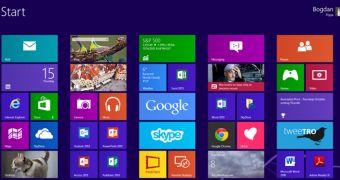CEO Steve Ballmer has already said that Microsoft sold 4 million Windows 8 upgrades in the first weekend after its debut, but it seems like sales of the new OS aren’t going exactly as expected.
Citing an insider, Paul Thurrott of Winsupersite.com writes that Windows 8 is already considered a disappointing product in the Redmond campus when it comes to sales.
Microsoft is yet to release any official sales figures, but executives have already released optimistic sales projections, hinting that the company expects to ship millions of copies before year-end.
What’s more interesting, however, is that Microsoft blames PC makers for Windows 8’s disappointing sales performance, claiming that end users don’t have enough choices to buy Windows 8 devices.
The number of computers, laptops and tablets running Windows 8 is still small at this point, but several companies have already confirmed their plans to release such products in the near future.
This is actually another reason for Microsoft’s intentions to continue efforts in the hardware industry. By developing its own PC and devices, Microsoft would only have to rely on its own products when launching new software, but would also hurt sales of many other players in the hardware sector.
In addition, these disappointing yet unknown sales figures also bring Steven Sinofsky back in the spotlight. It’s not yet clear whether Sinofsky has left the company because of the slow Windows 8 sales, but more and more signs are suggesting that this was actually one of the reasons for the upper management shift within Microsoft.
Of course, critics could mention many reasons for Windows 8’s failure to impress, including the major changes in the GUI and the other often-considered “confusing” elements, but it remains to be seen what the impact of all these changes is over the average end user.
Microsoft is yet to comment on the matter, but we’ve contacted the Redmondians, so we’ll get back to you when we receive an answer.

 14 DAY TRIAL //
14 DAY TRIAL //